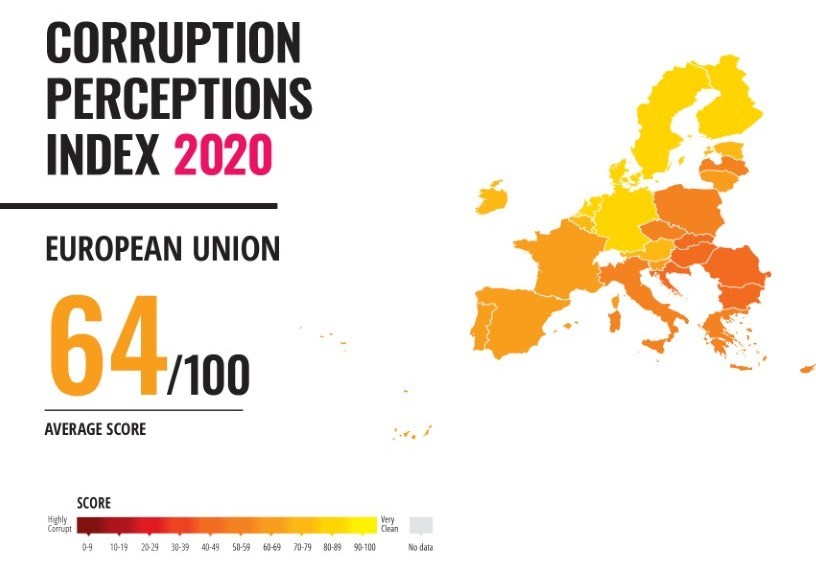Transparency International published this week its annual Corruption Perception Index (CPI) covering 180 countries. A majority of countries are showing little to no improvement in 2020 in tackling corruption.
Last year, just before the outbreak of the coronavirus crisis, the organisation underlined that corruption is more pervasive in countries where big money can flow freely into electoral campaigns and where governments listen only to the voices of wealthy or well-connected individuals. This time, Transparency International (TI) focuses on the impact of corruption on the fight against COVID-19.
Persistent corruption is undermining health care systems and contributing to democratic backsliding amid the COVID-19 pandemic. Countries that perform well on the index invest more in health care, are better able to provide universal health coverage and are less likely to violate democratic norms and institutions or the rule of law.
”The pandemic has tested the limits of Europe’s emergency response, and in many cases, countries have fallen short of full transparency and accountability,” a spokesperson of TI’s EU office told The Brussels Times. Based in Berlin, TI aims at fighting corruption globally and has branches all around the world.
“In Hungary for example, which is one of the lowest scoring countries in the EU, the government has been repeatedly called out for attempting ‘power grabs’ during the crisis. These ‘emergency measures’ were also a big concern for civil society in Hungary.”
Among the Visegrád countries, Hungary’s anti-corruption performance has deteriorated the most since 2012. You are still expected to pay under the table for medical care but this form of petty corruption might disappear with newly announced salary increases for physicians, one of the few positive notes.
The index ranks the countries by their perceived levels of public sector corruption, according to experts and business people. It uses a scale of zero to 100, where zero is highly corrupt and 100 is very clean. A score under 50 indicates a serious problem.
Denmark and New Zealand top the index, with 88 points. War-torn countries and countries suffering prolonged political-economic crises, such as Afghanistan, Iraq, Libya, Syria, Somalia, Sudan, South Sudan, Yemen and Venezuela come last, with points ranging from 12 to 21.
Nearly half of countries have been stagnant on the index for almost a decade, indicating stalled government efforts to tackle the root causes of corruption. More than two-thirds score below 50.
Are the countries with a CPI below 50 corrupt or just countries with more corruption than those above 50? “The CPI does not categorise countries as ‘corrupt’ or ‘clean’ but rather puts them on a scale,” a spokesperson of the TI office in Berlin replied.
With an average score of 64 (a decrease by two points compared to 2019), the European Union (EU) is among the highest performing regions on the CPI, but is under enormous strain due to COVID-19 and rule of law crises. Denmark (88) is hitting the top spot, followed by Finland (85), and Sweden (85). Conversely, the lowest performers from the region are Romania (44), Hungary (44) and Bulgaria (44).
The best performing country among the member states that joined the EU in 2004 is Estonia with a score of 75 points, well before older member states such as Greece (50), Italy (53), Portugal (61) and Spain (62).
Countries at the top and the bottom
Countries with the highest scores in the ranking are not immune to corruption. Some of them have been rocked by money laundering scandals and other private sector corruption in trade with third countries.
“There are major gaps in the oversight of the financial industry in top-scoring countries,” according to TI. “Scandals from recent years have shown that banks in Denmark, Norway and Sweden have become easy targets of corrupt actors from around the world.”
The money-laundering scandal involved the Estonia branch of Danske Bank, the biggest lender in Denmark. New evidence that came to light last year has also revealed glaring gaps in oversight over Nordic banks, including in Sweden.
The shortcomings in supervision of the financial sector is a problem many top-performing countries face. In Germany, following the Wirecard scandal, for example, the authorities could not decide who should have been responsible for supervising the fintech company. “No country is safe from corruption, and we must keep up the fight against it to avoid backsliding.”
As regards the candidate countries, Turkey and the Western Balkans, the situation is even worse. Besides Montenegro (45) and Turkey (40), all of them have scores below 40. Worrying are the low scores in Albania (36) and North Macedonia (35) that soon are expected to start accession negotiations with the EU.
Has the fight against corruption been neglected during the pandemic?
”With an average score of 36, Eastern Europe and Central Asia is the second-lowest performing region on the CPI and vulnerable to corruption compounded by COVID-19,” the EU office of TI replied.” With a score of 38, Serbia earned its lowest score since 2012. The country’s biggest corruption challenges include serious rule-of-law issues, continued democratic erosion and efforts to silence critical voices.”
One interesting thing to note is that some countries in this region score better than EU member states. Georgia (56), Armenia (49) and Belarus (47), all have higher scores than Hungary, Bulgaria and Romania (44).
It is true that the validity of the ranking for a certain year and country can be put into question. However, the lack of improvement over time, despite EU support, does give rise to a useful debate on underlying casual factors and actual corruption cases.
The perception index cannot easily be dismissed as subjective. The index is based on several assessments made by banks and rating institutes. Perception matters. If a government or public administration is perceived as corrupt, citizens will have less trust in them and foreign investors may stay away.
M. Apelblat
The Brussels Times

